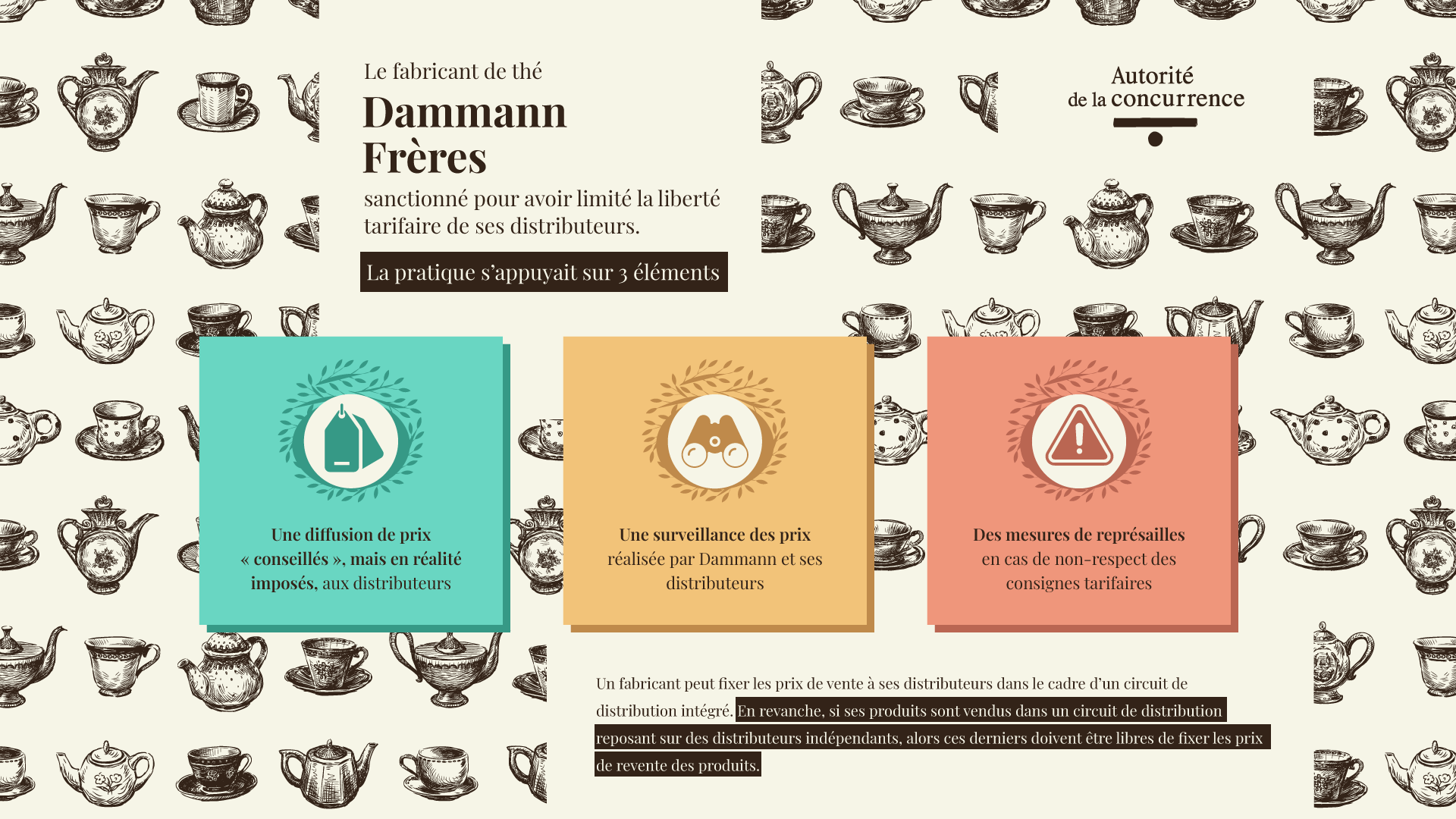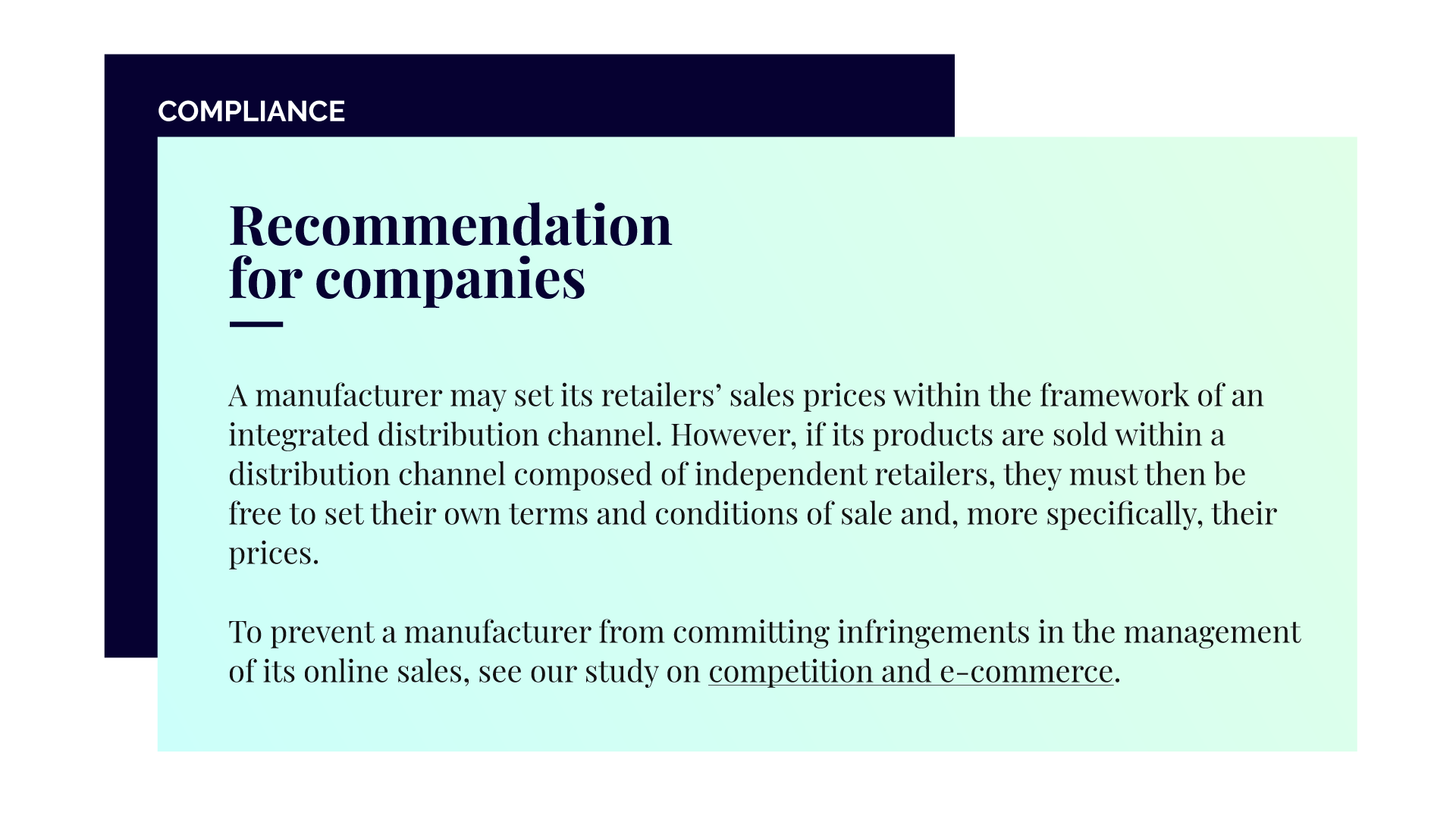The Autorité de la concurrence hands out a fine to Dammann Frères tea for imposing sales prices on the retailers selling its products online.

Background
Following an investigation report from the Directorate General for Competition Policy, Consumer Affairs and Fraud Control (DGCCRF), the Autorité de la concurrence is today imposing a fine of €226,000 on tea producer Dammann Frères for restricting the pricing freedom of its retailers from April 2015 to June 2017 by setting the final sales price of its brand products sold online. The Autorité found that Dammann Frères, under the pretext of providing its retailers with recommended prices, had in fact imposed resale prices. Failure to comply with these sales prices was sometimes sanctioned by Dammann Frères by retaliating against retailers who continued to ignore its price incentives.
By preventing its online retailers from freely determining their online sales prices, Dammann Frères deprived final consumers of the benefits resulting from price competition between retailers.
The distribution of supposed ‘recommended’ prices by Dammann Frères
Dammann Frères distributed supposed ‘recommended’ prices to its retailers through its annual catalogues. In reality, it encouraged them to strictly comply with the prices, in particular by leaning on its general terms and conditions of sale and on online distribution agreements. Many retailers can corroborate these practices:
As an example:
The manager of a retailer explained: “Dammann does not want me to sell their products below the price that they charge on their own website and that are the recommended prices that appear in their catalogue that we receive each year.”
The CEO of another retailer said: “We are free to set our retail prices in store, but we must comply with the Recommended Retail Price set by Dammann Frères for online sales.”
Price monitoring
Dammann Frères was very attentive to the prices charged online and ensured that retailers respected these prices.
The sales manager of Dammann Frères said: “Sales people inform us of cases where prices are particularly low.”
Dammann Frères also relied on monitoring carried out by a number of its retailers, who would inform them when they found that the recommended prices were not being applied by some of their competitors.
The sales manager of Dammann Frères said that “in 90% of cases, information on prices is reported by the network of retailers who alert [them] to the prices charged by some of their competitors.”
Retaliation and sanction measures in place in case of failure to comply with prices
Retailers who ignored the instructions and actions of Dammann Frères on the need to implement the “recommended prices” faced various forms of sanction: revocation or modification of the discounts granted, delay or cancellation of their deliveries, removal of their contact information from the list of retailers on the Dammann Frères website or even, in some cases, the unilateral termination of their commercial relations with Dammann Frères.
As an example:
The CEO of a retailer said that a Dammann Frères sales representative told him that “far too low” online sales prices, which he equated to “dumping,” was the reason behind the revocation of the discounts granted to him previously.
The operator of an e-commerce website indicated: “In the end, a verbal agreement was reached between my lawyer and that of Dammann Frères: they will resume deliveries and reimburse me for the bailiff fees and, in exchange, I will raise my sales prices a little bit. So I am now raising my prices by about 10%.”
Practices that reduced competition for consumers
Dammann Frères sought to align the prices of all e-commerce websites selling its products with those of its online shop, in order to protect the latter from the competition of these websites. This price-fixing practice, very widely applied by retailers, limited intrabrand competition, i.e. competition between the different websites selling Dammann Frères branded products.
Retailers were thereby prevented from freely determining their sales prices on the Internet and hindered in the development of their online sales. Final customers were also deprived of the opportunity to take full advantage of competition between the different online distribution channels and benefit from the best price.
In light of these details, the Autorité de la concurrence imposed a €226,000 fine on Dammann Frères.

Decision 20-D-20 of 3 December 2020
Contact(s)

